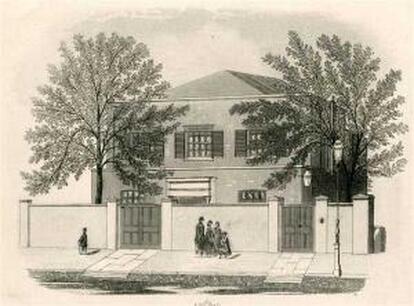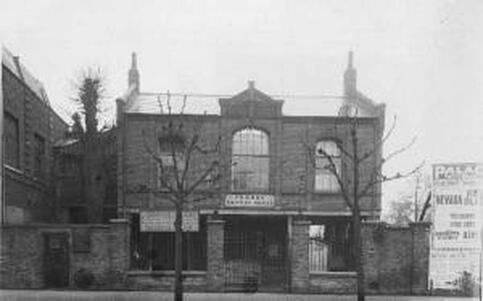 Sketch of the Friends Meeting House Tottenham © Bruce Castle Museum (Haringey Culture, Libraries and Learning)
Sketch of the Friends Meeting House Tottenham © Bruce Castle Museum (Haringey Culture, Libraries and Learning)
Luke Howard was a member of the Religious Society of Friends, more commonly known as the Quakers. He attended Monthly Meetings at the Friends Meeting House in Tottenham before he moved to the area in 1813. The meeting house had been built in 1714 and the adjoining burial ground added in 1803.
Luke Howard was a deeply religious man who wrote tracts upholding
the Quaker way of life and he followed its traditions of service and humility.
In 1815 he was acknowledged as a minister of the monthly meeting, he held offices at quarterly meetings and attended the Yearly meeting.
However his approach to the ministry differed from that of his fellow Quakers. At a time when bibles were not to be read in public, he brought a large bible to the meeting and as a result the meeting was adjourned and he himself referred to ‘as deranged‘. The incident was significant as Luke Howard was one of the first prominent Friends to take a pronounced evangelical position. Mariabella had already left the Society in 1810 at an earlier time of controversy and Luke Howard finally left in 1836. At a time of controversies concerning scriptural authority he supported the group led by Isaac Crewdson who had published A Beacon to the Society of Friends, which had an evangelical message. The ‘Beaconites’ supported the Quaker way of life and duty, but held that the scriptures revealed the word of God and called for acceptance of baptism and the Lord’s supper. He joined the Brethren and was baptised by Crewdson in June 1837. He supported his sons in establishing the Brook Street Meeting House (later Chapel).
During this time Luke Howard also held offices in the Tottenham Vestry and was elected overseer of the poor in 1820. The Vestry was a committee for secular and church government within a parish ie a meeting of the ‘great and the good’ and in addition to overseers included roles such as church warden, sexton and beadle. (The name comes from the Vestry, or robing room of a church, where meetings were often held).
Luke Howard was a deeply religious man who wrote tracts upholding
the Quaker way of life and he followed its traditions of service and humility.
In 1815 he was acknowledged as a minister of the monthly meeting, he held offices at quarterly meetings and attended the Yearly meeting.
However his approach to the ministry differed from that of his fellow Quakers. At a time when bibles were not to be read in public, he brought a large bible to the meeting and as a result the meeting was adjourned and he himself referred to ‘as deranged‘. The incident was significant as Luke Howard was one of the first prominent Friends to take a pronounced evangelical position. Mariabella had already left the Society in 1810 at an earlier time of controversy and Luke Howard finally left in 1836. At a time of controversies concerning scriptural authority he supported the group led by Isaac Crewdson who had published A Beacon to the Society of Friends, which had an evangelical message. The ‘Beaconites’ supported the Quaker way of life and duty, but held that the scriptures revealed the word of God and called for acceptance of baptism and the Lord’s supper. He joined the Brethren and was baptised by Crewdson in June 1837. He supported his sons in establishing the Brook Street Meeting House (later Chapel).
During this time Luke Howard also held offices in the Tottenham Vestry and was elected overseer of the poor in 1820. The Vestry was a committee for secular and church government within a parish ie a meeting of the ‘great and the good’ and in addition to overseers included roles such as church warden, sexton and beadle. (The name comes from the Vestry, or robing room of a church, where meetings were often held).
|
The Friends Meeting House was registered as 594 High Road in 1854 and further altered in 1880. However in 1961 the old building was demolished and new first floor premises on the same site, behind offices and over a supermarket, were opened in 1962. |
Sources: The Quakers of Tottenham 1775 – 1825, R. Collie, Edmonton Hundred Historical Society, 1978; British History Online; Oxford Dictionary of National Biography



